Jul
02
2020
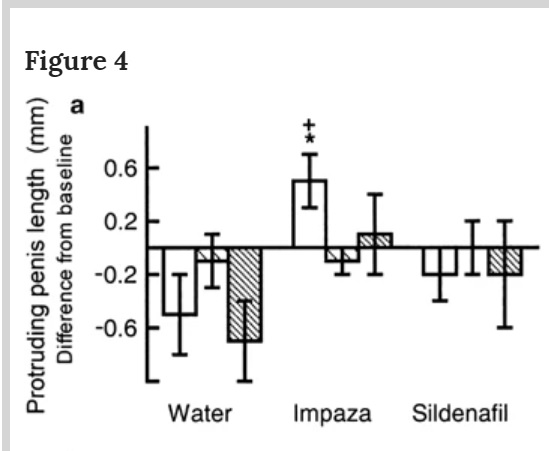 A study by Russian researcher purports to find that a treatment, Impaza, increases penis length during copulation in rats, while the water placebo group and sildenafil (Viagra) did not. The authors conclude: “This effect, together with an absence of motivational actions, suggests that Impaza may be the most valuable treatment for erectile dysfunction.” The study was originally published in the International Journal of Impotence Research, but was later retracted by the editors. The primary reason for the retraction is that the editors discovered that Impaza is a homeopathic product, something that was apparently missed on initial peer review.
A study by Russian researcher purports to find that a treatment, Impaza, increases penis length during copulation in rats, while the water placebo group and sildenafil (Viagra) did not. The authors conclude: “This effect, together with an absence of motivational actions, suggests that Impaza may be the most valuable treatment for erectile dysfunction.” The study was originally published in the International Journal of Impotence Research, but was later retracted by the editors. The primary reason for the retraction is that the editors discovered that Impaza is a homeopathic product, something that was apparently missed on initial peer review.
This is definitely an editorial fail, but at least it was quickly corrected. To put the failure in context, however, Impaza was not presented as homeopathic, but rather as a “release-active antibody-based” drug. This is code in Russia, apparently, to disguise the homeopathic nature of certain products. It is not uncommon in pseudoscience for proponents to come up with scientific sounding euphemisms for their nonsense in order to hide from the negative association with charlatans and quacks.
Editors and reviewers, however, need to dig deep enough to uncover such pseudoscience. At the very least there was a lack of curiosity on the part of the editors, and insufficient vigilance against the intrusion of pseudoscience.
Continue Reading »
May
21
2019
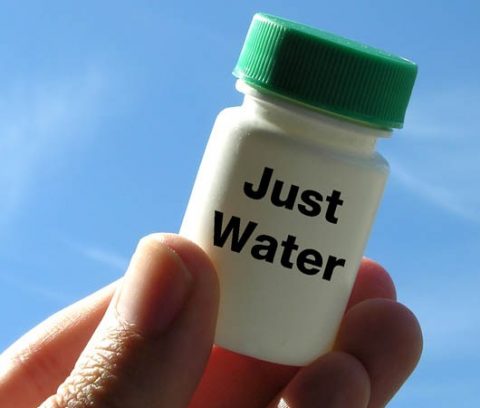 The Center for Inquiry (CFI) is suing Walmart for their marketing of homeopathic products, similar to a prior lawsuit against CVS. Their claim is that Walmart is using deceptive practices to sell homeopathy, implying that such products are equivalent to science-based remedies. While I applaud their effort, you can tell by reading the reporting that it is ultimately an exercise in futility.
The Center for Inquiry (CFI) is suing Walmart for their marketing of homeopathic products, similar to a prior lawsuit against CVS. Their claim is that Walmart is using deceptive practices to sell homeopathy, implying that such products are equivalent to science-based remedies. While I applaud their effort, you can tell by reading the reporting that it is ultimately an exercise in futility.
First let me clearly state my underlying premise – homeopathy is pure 100% nonsense. It is a 200+ year old pre-scientific system of potions with no basis in reality. It is simply witchcraft. And if that is not enough for you, it has been tested in clinical trials (despite being utter nonsense) and has been convincingly, and unsurprisingly, shown to have no effect.
The inherent contradiction this undeniable fact creates is, how do you market homeopathic products without deception and harm? The answer is – you can’t. The only way to actually sell the product is to deceive the customer on some level.
The FDA and FTC have tried to strike a balance between freedom and consumer protection when it comes to homeopathy, but this is a hopeless endeavor. There is no balance. So they each have their guidelines for the industry to promote transparency, honesty in labeling, and to minimize deception. Of course these regulations don’t go far enough. They just mean the industry has to be a little more clever and coy in their marketing.
Continue Reading »
Sep
04
2018
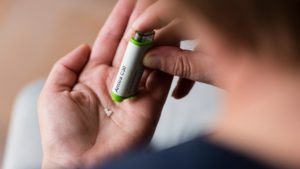 France is the world’s biggest consumer of homeopathic potions. According to a study by Edzard Ernst:
France is the world’s biggest consumer of homeopathic potions. According to a study by Edzard Ernst:
The results show that a total of 6,705,420 patients received at least one reimbursement for a homeopathic preparation during the 12-month period. This number equates to 10.2% of the French population, with a predominance in females (68%) and a peak frequency observed in children aged 0-4 years (18%).
This is unfortunate, because homeopathy is pure pseudoscience, costing French taxpayers €279 million in one year. But there is some good news – homeopathy has been in retreat around the world, at least in terms of official recognition and reimbursement. Homeopathy hospitals are closing in the UK, the FDA has decided to finally start regulating at least the worst homeopathic offenders, and now a French university, Lille, has decided to suspend its homeopathy degree for the 2018-19 academic year.
Further (and here is the big lesson here, in my opinion) this is mostly in response to scientists taking the time to review homeopathy and declare that it is not based in science and does not work.
So what happened in France, where homeopathy is very popular? Well, in March 2018, 124 French doctors signed a statement taking a strong stand not only against homeopathy, but all kinds of pseudoscience in medicine. The entire statement is worth a read, but here are some highlights:
The obligation of honesty is enshrined in the Codes of ethics of the medical professions and the Code of public health (article 39 of the Code of ethics and article R.4127-39 of the Code of public health). The codes forbid charlatanism and deception, impose to prescribe and distribute only proven treatments. The codes also proscribe the use of secret remedies or not clearly mentioning the substances they contain. The Council of the Order of Physicians is responsible for ensuring that its members do not use their title to promote practices whose science has never proven useful or even dangerous. The Council must ensure that doctors do not become trade representatives of unscrupulous industries.
Homeopathy, like other practices called “alternative medicine”, is in no way scientific. These practices are based on beliefs that promise a miraculous and safe recovery.
Continue Reading »
Jun
07
2018
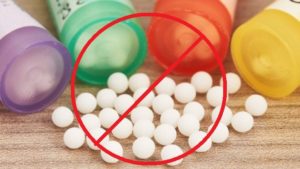 The National Health Service (NHS) in England decided in November 2017 to stop funding homeopathic treatments. That was an excellent decision, made for the right reasons – “lack of robust evidence of clinical effectiveness”. While I think that is an understatement, it is true enough, and is sufficient justification for any modern health care system to abandon homeopathy.
The National Health Service (NHS) in England decided in November 2017 to stop funding homeopathic treatments. That was an excellent decision, made for the right reasons – “lack of robust evidence of clinical effectiveness”. While I think that is an understatement, it is true enough, and is sufficient justification for any modern health care system to abandon homeopathy.
Now a High Court Judge has affirmed that decision by the NHS. Why was a judge even involved? Because the British Homeopathic Association (BHA) sued the NHS over that decision.
Legally, this case was fairly straight forward. The judge was clear to point out that it was not his job to review the scientific evidence regarding homeopathy. The BHA argued in court that there is “plain evidence that homeopathic treatment does work in particular cases”. That is complete nonsense – homeopathy is nothing but magic potions, with no scientific plausibility, and the scientific evidence clearly shows that it does not work for anything.
But the judge did not have to get into that in court, which is appropriate. It should not be for a judge to make scientific decisions like that. His job was to answer the BHA complaint that the NHS was being unfair in their decision. The judge ruled, however, that the NHS process was “fair and balanced” and that “there was no evidence of ‘bias or predetermination'”.
I do worry when such issues come up before courts or regulatory bodies. It is easy to make the claim of bias against those who are simply following the evidence. It would, for example, be easy to make the case that I am “biased” against homeopathy. After all, I have been regularly trashing the pseudoscience for years. But in reality I am just following logic and evidence. Correctly stating that something is pseudoscience is not a bias when it is the logical conclusion of a fair process.
Continue Reading »
Feb
09
2018
 Here we go again.
Here we go again.
If you are in a decision-making position at an institution of higher learning than you have a responsibility to understand and protect the academic reputation of that institution. Further, such institutions (many of which, as in this case, are publicly funded) have a responsibility to society, to promote academic standards and legitimacy. At the very least such institutions should not be promoting pseudoscience, or dressing up any nonsense as if it were real.
Georgian College in Ontario has approved funds and plans to open a program that will teach homeopathy as if it is real medicine. Teaching any pseudoscience is an outrage, but when it is medical pseudoscience there is also arguably another layer of malfeasance because the connection to real harm is more direct.
I know this is old territory here, but for review: Homeopathy is a prescientific philosophy-based system based on magical thinking. Its core ideas were never valid, and have never been supported by science. Essentially, homeopathy uses fanciful treatments that are based on silly ideas, such as the personality of the patient, but also “sympathetic magic.” The belief is that homeopathic remedies contain the magical essence of symptoms and can be used to cure those same symptoms.
Then, doubling down on the idea of magical essence, all actual substances are diluted out of existence, so that only the essence remains. Therefore, in reality, only water remains. Homeopathy is literally treating people with magic water created with rituals resembling witchcraft, and without the tiniest bit of scientific legitimacy.
Continue Reading »
Sep
14
2017
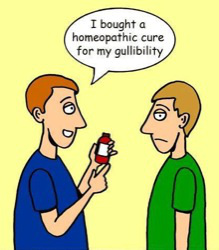 As I continue my efforts to fight against pseudoscience in medicine, I often ask myself – how bad can it theoretically get? I have had this discussion with others as well, some of whom argue that we should not worry because science will win out in the long run. Science is self-corrective, and pseudoscience will become marginalized over time. I hope this optimistic view is correct, but I am not reassured by the evidence.
As I continue my efforts to fight against pseudoscience in medicine, I often ask myself – how bad can it theoretically get? I have had this discussion with others as well, some of whom argue that we should not worry because science will win out in the long run. Science is self-corrective, and pseudoscience will become marginalized over time. I hope this optimistic view is correct, but I am not reassured by the evidence.
Let’s consider a recent article in the Hindustan Times, written completely without skepticism or irony, which details how the government of India has opened a state-of-the art laboratory to study homeopathy.
Howrah-based Centre of Excellence in Fundamental Research in Homoeopathy will also undertake fundamental research studies in homoeopathy with an interdisciplinary approach.
“This institute has undertaken several clinical research studies such as autism, psoriasis, vitiligo, breast cancer, hypertension, migraine etc. along with proving of new drugs in homoeopathy with their clinical validations,” said Naik.
The lab will support PhD students in homeopathy and focus on research into viral and other infectious diseases. This is all part of the Ministry of Ayurveda, Yoga and Naturopathy, Unani, Siddha and Homoeopathy (AYUSH). In India, pseudoscience in medicine, including homeopathy, have been fully institutionalized and are explicitly endorsed by the government.
This is how bad it can get.
Continue Reading »
Jul
21
2017
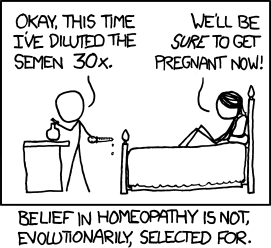 I have long considered homeopathy to be the softest of targets for skeptics, especially in the area of alternative medicine. Homeopathy is 100% pure nonsense. It is a pre-scientific magical form of medicine that has no legitimate place in the modern world.
I have long considered homeopathy to be the softest of targets for skeptics, especially in the area of alternative medicine. Homeopathy is 100% pure nonsense. It is a pre-scientific magical form of medicine that has no legitimate place in the modern world.
Further, homeopathy is particularly vulnerable because most people do not know how silly it is. They think it is natural or herbal medicine, but it’s not. Homeopathy involves taking fanciful treatments and then diluting them out of existence, based on the notion that the essence of the substance will be left behind and magically cure whatever ails you.
This means that simply educating the public about what homeopathy actually is can be an effective way to reduce its popularity. Knowledge is not sufficient, however, because there is no limit to what people are capable of believing. Nonsense is rarely eradicated entirely, but we can certainly restrict it to the fringe where it belongs.
Homeopathy in Australia
In 2015 the Australian National Health and Medical Research Council (NHMRC) concluding that homeopathic treatments were worthless, and that the scientific evidence has not shown that they work for any single indication.
Continue Reading »
Oct
11
2016
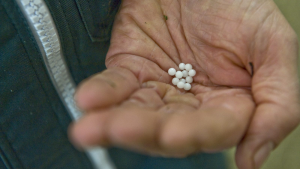 A Canadian academic, Dr. Mark Loeb, who is a respected infectious disease researcher who knows how to conduct high quality research, wants to study homeopathic nosodes. Nosodes are essentially homeopathic vaccines.
A Canadian academic, Dr. Mark Loeb, who is a respected infectious disease researcher who knows how to conduct high quality research, wants to study homeopathic nosodes. Nosodes are essentially homeopathic vaccines.
Tim Caulfield, a Canadian professor of health law and policy, thinks the study is misguided and unethical. The two are having a respectful public debate about the risks and merits of doing such a study.
David Gorski and I have actually published in the peer-reviewed literature on the broader question of studying alternative medicine: Clinical trials of integrative medicine: testing whether magic works? It is a bit of a dilemma, and we are seeing that exact dilemma play out on the question of this specific proposed study.
Homeopathy is Pseudoscience
For quick background, both sides in this debate agree that homeopathy is 100% pseudoscientific nonsense. Homeopathy was invented by one person, Samuel Hahnemann, about 200 years ago. It was not based on any scientific research or knowledge base, it did not develop out of emerging knowledge of biology or physiology. It was simply invented out of whole cloth based loosely on the superstitious belief in sympathetic magic – the notion that substances contain a mysterious “essence” that can be transferred to the body and stimulate the life force.
Continue Reading »
Jul
08
2016
 Yes. Yes we should.
Yes. Yes we should.
This is an interesting idea I had not previously considered. Danny Chambers is a UK veterinarian from Devon who started a Change.org petition to ban the veterinary use of homeopathy in the UK. He has 1,000 signatures from UK vets so far (out of the 22,000 total UK vets).
Chambers said:
“We think vets these days should be offering 21st Century medicine,” he told BBC News.
“It’s been shown that homeopathy doesn’t work, so it probably shouldn’t be offered any more even if it is offered with good intentions.”
It is absolutely clear that homeopathy is worthless. This is among the most solid conclusions in all of medical science. First, there is no possible way according to our current understanding of physics, chemistry, and physiology that homeopathic potions can have any biological effect. It’s not just unknown – we have very good reasons to conclude that homeopathy cannot work (follow the link above for more details if you are unfamiliar with these reasons).
Continue Reading »
Feb
22
2016
 In a recent blog post for the BMJ, Paul Glasziou wrote about the recent Australian review of homeopathic remedies of which he was head:
In a recent blog post for the BMJ, Paul Glasziou wrote about the recent Australian review of homeopathic remedies of which he was head:
…I lost interest after looking at the 57 systematic reviews (on 68 conditions) which contained 176 individual studies and finding no discernible convincing effects beyond placebo.
He is not the first person to look at the totality of clinical evidence for homeopathy and find it wanting. Glasziou was chair of the working party that produced the 2015 NHMRC report on homeopathy, which concluded:
Based on the assessment of the evidence of effectiveness of homeopathy, NHMRC concludes that there are no health conditions for which there is reliable evidence that homeopathy is effective.
So, after more than two centuries, and thousands of studies in total, no homeopathic treatment has crossed over the line of what would generally be considered sufficient evidence to prove that it works. That is very telling. I liken the evidence to other dubious claims, such as ESP. After a century of research and thousands of studies there is no clear evidence that ESP is real.
For both homeopathy and ESP there is a great deal of noise, but no clear signal. There are many flawed or small studies, but no repeatable high quality studies. Continue Reading »
 A study by Russian researcher purports to find that a treatment, Impaza, increases penis length during copulation in rats, while the water placebo group and sildenafil (Viagra) did not. The authors conclude: “This effect, together with an absence of motivational actions, suggests that Impaza may be the most valuable treatment for erectile dysfunction.” The study was originally published in the International Journal of Impotence Research, but was later retracted by the editors. The primary reason for the retraction is that the editors discovered that Impaza is a homeopathic product, something that was apparently missed on initial peer review.
A study by Russian researcher purports to find that a treatment, Impaza, increases penis length during copulation in rats, while the water placebo group and sildenafil (Viagra) did not. The authors conclude: “This effect, together with an absence of motivational actions, suggests that Impaza may be the most valuable treatment for erectile dysfunction.” The study was originally published in the International Journal of Impotence Research, but was later retracted by the editors. The primary reason for the retraction is that the editors discovered that Impaza is a homeopathic product, something that was apparently missed on initial peer review.
 The Center for Inquiry (CFI)
The Center for Inquiry (CFI) France is the world’s biggest consumer of
France is the world’s biggest consumer of  The National Health Service (NHS) in England decided in November 2017 to stop funding homeopathic treatments. That was an excellent decision, made for the right reasons – “lack of robust evidence of clinical effectiveness”. While I think that is an understatement, it is true enough, and is sufficient justification for any modern health care system to abandon homeopathy.
The National Health Service (NHS) in England decided in November 2017 to stop funding homeopathic treatments. That was an excellent decision, made for the right reasons – “lack of robust evidence of clinical effectiveness”. While I think that is an understatement, it is true enough, and is sufficient justification for any modern health care system to abandon homeopathy. Here we go again.
Here we go again. As I continue my efforts to fight against pseudoscience in medicine, I often ask myself – how bad can it theoretically get? I have had this discussion with others as well, some of whom argue that we should not worry because science will win out in the long run. Science is self-corrective, and pseudoscience will become marginalized over time. I hope this optimistic view is correct, but I am not reassured by the evidence.
As I continue my efforts to fight against pseudoscience in medicine, I often ask myself – how bad can it theoretically get? I have had this discussion with others as well, some of whom argue that we should not worry because science will win out in the long run. Science is self-corrective, and pseudoscience will become marginalized over time. I hope this optimistic view is correct, but I am not reassured by the evidence. I have long considered homeopathy to be the softest of targets for skeptics, especially in the area of alternative medicine.
I have long considered homeopathy to be the softest of targets for skeptics, especially in the area of alternative medicine.  A Canadian academic, Dr. Mark Loeb, who is a respected infectious disease researcher who knows how to conduct high quality research, wants to study homeopathic nosodes. Nosodes are essentially homeopathic vaccines.
A Canadian academic, Dr. Mark Loeb, who is a respected infectious disease researcher who knows how to conduct high quality research, wants to study homeopathic nosodes. Nosodes are essentially homeopathic vaccines. Yes. Yes we should.
Yes. Yes we should. In a r
In a r




